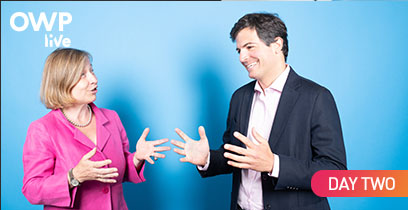Swiss watchmaking’s lessons on managing in a crisis
The luxury goods industry is about to be transformed: the leading brands need to shift away from the competitive rivalry that has driven growth in recent decades, and go back to their roots of customer centricity, according to one industry leader.
François-Henry Bennahmias, chief executive of the Swiss watch brand Audemars Piguet (AP), kicked off the second day of IMD’s Orchestrating Winning Performance program by warning his audience that luxury goods makers had neglected customers as companies prioritized besting their challengers.
Over the past two decades business grew exponentially but so, too, did costs as firms outbid each other for the top stores and talent. Bennahmias explained the transformation of AP, a family-owned business established in 1875, ignited by the COVID-19 crisis.
He launched his People to People strategy last April to give watchmaking more of an identity, in the belief that emotion, exclusivity and craftsmanship drive luxury watch purchases. “The perspective, the attitude, everything has got a face, and that has changed the mindset,” said Bennahmias.
The project started out by reminding AP staff how to work together and then extended to customers with the company stressing the importance of the client. In the past, with demand outstripping supply, customers had not always been prioritized.
A key message the CEO relays is to always be curious and open to new things. “Leadership is also about listening,” he added. Read more about his strategy.
Escape the shackles of a fixed mindset to unleash growth
Rigid ways of thinking can snuff out innovation and catalyze risk-aversion in teams. That will limit growth in today’s increasingly complex business environment.
“People who have more of a growth mindset, as they approach challenges in life, tend to be more successful,” said Jennifer Jordan, Professor of Leadership and Organizational Behavior.
“That’s really a marker for success in a VUCA world,” added Adjunct Professor of Leadership, Heather Cairns-Lee, referring to volatility, uncertainty, complexity and ambiguity.
The professors explained how beliefs influence behavior — and how to identify and overcome these problems, leveraging research by American psychologist Carol Dweck.
People with fixed mindsets will think intellect and talent are static, while growth-orientated leaders see them as something they can hone. The latter enjoy challenges, appreciate feedback and put in hard graft. The former shy away from obstacles, balk at feedback and perceive effort as weakness. Such behaviors are usually picked up in childhood and carried through to the workplace.
Saying ‘yes’ more often while also seeking direction will support the development of a growth mindset. Cairns-Lee and Jordan also recommend deliberate practice, confronting your defensiveness, as well as ‘talking back’ to your fixed mindset.
Leaders can encourage teams to embrace their own growth mindset by understanding their behavioral triggers, being aware of and mitigating the ‘set-up to fail’ syndrome, and by simply asking at the end of discussions: was that a growth or a fixed mindset meeting?
Linking a global outlook with competitive advantage
A global mindset is a key success factor when doing business internationally and a source of competitive advantage. It could even help your company navigate rising geopolitical tensions, and it’s vital in the era of remote work, with video-conferencing tearing down some barriers to cross-cultural collaboration.
Companies seeking market domination on a global scale face challenges — serving varied customer needs, coordinating business activities across national boundaries, and complying with multiple regulatory regimes.
A global mindset means perceiving and influencing differences across cultural contexts. And part of this involves understanding cultural differences, finding commonalities, resolving conflicts, building on ideas and encouraging participation. Doing so is one key to outperformance, said Bettina Büchel, Professor of Strategy and Organization at IMD: “Having a global mindset helps to manage these diverse teams in a better way.”
Büchel also stressed the importance of developing inter-cultural competencies, through expanding international networks. Building intercultural competences includes three main dimensions: perception management (inquisitiveness, tolerance); relationship management (emotional sensitivity, self-awareness); self-management (confidence and emotional resilience).
Niccolò Pisani, IMD Professor of Strategy and International Business, highlighted the importance of the trade-off between local adaptation and global standardization. With travel restrictions having dampened international mobility amid an increasingly volatile geopolitical environment, a deeper understanding of cross-cultural differences can really give companies a competitive edge, and address local customers’ needs.
“The importance of the ability to adapt to the local requirements and specificities when doing business internationally is becoming certainly more relevant,” he said.
‘WeChat knows more about you than your mother’
Speed to market and flexibility are two areas of innovation where Asian firms excel, and looking at some of the continent’s most revolutionary business models offers best practice in innovation for organizations across the world.
“While these [models] might only pop up once in a while, they have a massive impact. They are currently outliers, but are very special and could well dominate in the future,” said IMD Professor of Strategy and Innovation Patrick Reinmoeller.
One such model is the Ameba Management System (AMS) followed by Japan’s Kyocera, which provides ceramic parts for technology. The company operates in small units, meaning there is no corporate hierarchy. Each unit has the remit of doing what it thinks is best for the firm, without having to get approval from above. Net sales reached $15 billion in 2021 as a result.
The app space is seeing multiple innovations, with China’s WeChat providing an app-in-app service that is unique to China. Users stay logged in to WeChat while using lighter versions of third-party apps. WeChat is pumped full of user data as a result. Mark Greeven, Professor of Innovation and Strategy said: “WeChat knows more about you than your mother,” a fact that is being met with some pushback from younger generations.
Firms will need to be bold to mirror these endeavors.


